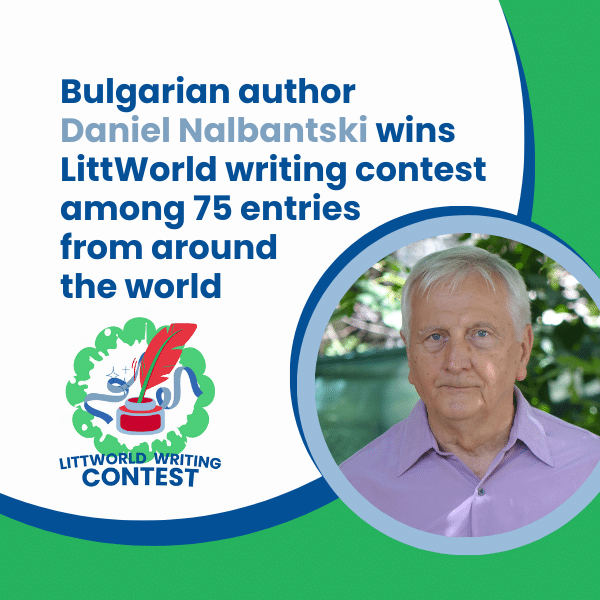Bulgarian writer and pastor Daniel Nalbantski has been selected as first-place winner in the LittWorld 2024 writing contest (English) among 75 entries from around the world. This is his winning story.
Meeting with a book
By Daniel Nalbantski
I was travelling by train. A stranger came into the compartment. It was clear at first sight that he was one of those people who cannot stay quiet. I knew he was going to start talking to me, I just had to wait to see how he was going to do it. I am always amazed at people like him who always find something to talk about and keep the conversation going. If something could be discussed in five minutes, people like him would take an hour to do so. And it would not be boring.
So, he did it. We quickly made the introductions and started talking informally to each other. He told me something that happened to him recently. He spoke fast, yet in a captivating manner. As a writer, I was enjoying his skill to present the events in a very interesting way. He was emphasizing details, mentioning various people who he described so well that I was able to understand who is who and their role in the story. He threw in some crunchy stories, he returned to the past, looked into the future as well. His expression was very rich, yet there was lightness in it.
So, briefly: he had invented some sort of a technology for the production of a special type of silicone. He had everything set to patent his invention. A co-worker of his somehow got the documentation and presented the product as his. He got it patented. My companion was outraged and decided to turn to the court of law.
Surprisingly, he ended up withdrawing his claims and not pursuing his rival in court. He was expecting me to ask why. And that’s what I asked.
He then got his briefcase and took a book out of it. I almost jumped. It was a book I had written, a collection of short modern parables covering various aspects of the Christian faith. I managed to handle my surprise and not say anything.
“Look what it says here,” he opened the book. I couldn’t help but notice the fact that it had been read many times; some passages were underlined. “If you take specks out of your brother’s eye, they wouldn’t be of much use. If you take out planks from your own eye, they will be of use. You can use the planks to make so many things, even build a house. You can even build a bridge above a river.”
He solemnly read the passage and looked at me victoriously.
“What do you say? Absolutely true.”
“These are words from the Gospel,” I objected.
“I know, I have read it. I never have thought about this side of things, though.”
“So, you decided to not take out specks but rather planks?”
“That’s right. And I intend to build a house with them.”
“Are you a Christian?”
“Yes, I’ve read the words of Jesus, but this parable helped me see things differently. And make a decision. There is no use in judging others, yet there is use in judging myself.”
“Still, your co-worker did something wrong.”
“It’s true, but I too have copied others, others have taught me things, I have read other people’s books. No one is a product of themselves alone. Many people have brought about what I have become. The fact he stole from me means I have created something good. And this is why we create various things, to be useful.”
“So, you are not going to press charges against your co-worker?”
“I will not. You know what happened? When I decided not to press charges against him, my imagination erupted and I invented something even better.”
“A new invention?”
“Yes, brand new. And much better.”
“You will have to protect it better this time!”
“I will. It was very interesting: when I refused to press charges, it was like I shook something off me. My mind used to be blocked by anger and I could not think of anything else but revenge. It all passed like a dark cloud. It was as if I went out of a tunnel. And I was able to give myself to active working.”
“This is great, congratulations!” I extended my hand to him. Then I pointed towards my book that he still kept in his hand. ”And what about this book, where did you find it?”
“I bought it from a bookstore and I am very happy with it. I could give it to you, if you wish, I will buy myself another one. It will be very helpful to you.”
“No, thanks, you can keep it. I will find it and buy it myself.”
“Do not forget to do it!”
I have asked myself whether it is worth writing and investing so much effort, time and heart in the composing of words. Publishing Christian books in a small country is a hard job. In our time where all eyes are staring into phones and materialism has tangled people’s hearts up, writing seems like a meaningless thing to do.
Yet, after my meeting on the train, I no longer ask myself if it is worth it.
Translated from Bulgarian into English by Biliana Nalbantska, daughter of the author.
Daniel Nalbantski is a Bulgarian writer and pastor. He began his ministry in the Communist era when being a Christian was dangerous and becoming a minister could lead to unimaginable troubles. He was part of an underground movement involved in translating and publishing Christian books that his wife typed on a typewriter and they secretly distributed among believers. After the fall of the Iron Curtain in the early 1990s, Daniel began writing Christian novels and a daily devotional guide that is still reaching readers after 20 years. He is the author of 15 novels and a collection of short stories. Daniel also writes poetry, and loves swimming and hiking. Daniel lives with his wife in Russe, Bulgaria.

